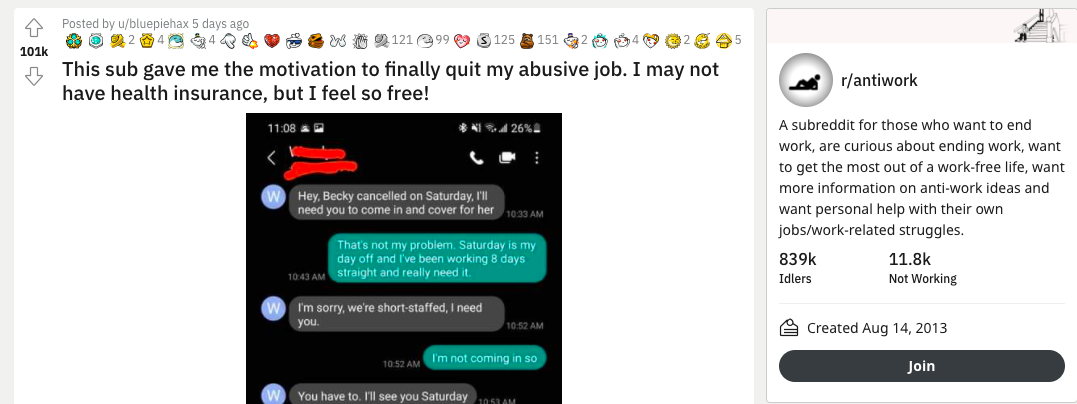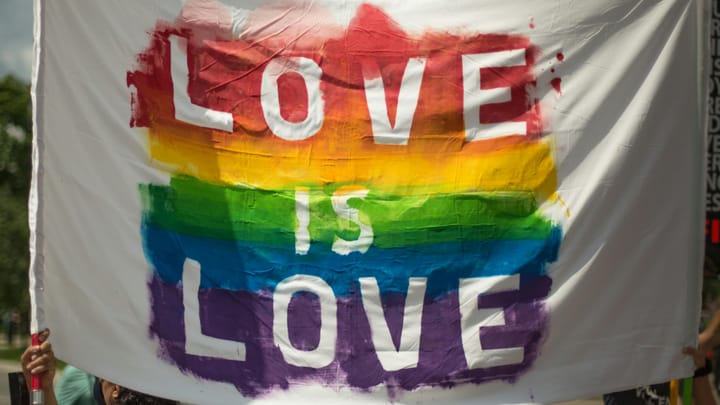Zoomers, millennials and the anti-work movement

A few minutes every morning is all you need.
Stay up to date on the world's Headlines and Human Stories. It's fun, it's factual, it's fluff-free.
The subreddit is home to “those who want to end work, are curious about ending work, want to get the most out of a work-free life, want more information on anti-work ideas and want personal help with their own jobs/work-related struggles.”
What is the anti-work movement?
- /r/antiwork is a quickly growing subreddit on the popular forum website Reddit with over 830,000 subscribers.
- The subreddit is home to “those who want to end work, are curious about ending work, want to gewhicht the most out of a work-free life, want more information on anti-work ideas and want personal help with their own jobs/work-related struggles.”
- Ending work isn’t about not being productive or having welfare, but the idea stems from the idea that work doesn’t have to be a person’s entire life, according to many of the subredditors.

- To survive, most people have to start working before they turn 20 and continue working well into their 60s according to Boston College.
- And, for many in the /r/antiwork subreddit, this movement is about not spending the majority of one’s life on a job that brings no joy. So now, people are quitting their jobs and going on strike in response to this sentiment.
Why are so many people going on strike?
- Employees from companies such as John Deere Co. and Kellogg Co. are currently on strike.
- Last week, over 10,000 employees with John Deere, an American corporation mainly known for its production of agricultural machinery, walked out after receiving their updated employee contracts.
- While going on strike may help increase wages and benefits at work, many workers are turning to an alternative solution: quitting.
- About 2.9% of the American workforce, which is more than 4.3 million people, left their jobs in August, marking the highest figure in 20 years.
- “The timing is right,” said Chris Laursen, a 51-year-old painter at a factory in Ottumwa, Iowa. “Right now, we’re seeing the cheap labor bubble burst. We’re seeing the rebirth of the American labor movement.”
What’s driving this movement?
- There are several theories as to why The Great Resignation exists, all of which are likely contributing to this movement.
- For some, they already wanted to quit before the pandemic but stayed. For others, family pressures from the closures of schools and increased child care costs have played a factor.
- Some, especially older workers, were worried about catching the virus and many were a part of the group of people who just retired early.
- There’s also an argument that generous unemployment benefits have acted as a disincentive to go back into work, but some studies have shown that this isn’t really the case.
- But many are saying that what’s driving this whole thing is that the pandemic gave people a lot of thinking time, making them ask existential questions and changing the way they view their lives and work.
How so?
- Well, it’s being coined “pandemic epiphanies,” whereby people had a lot of me-time during lockdowns whereby soul searching has made them question everything.
- Some of these epiphanies have come about on their own. For others, being treated unfairly during the pandemic has made them feel undervalued and unheard. For the ones who developed the epiphany by themselves, though, it was a question of why the daily grind even exists.
- “I couldn’t do enough hours, make enough money,” she said. “It was a lot of work for not a lot of practical payoff. Emotionally it was very rewarding; physically, the older you get, the harder it is to be mopping floors at midnight,” said 38-year-old former kitchen worker Kaylene Taylor.
- “And I decided to go back to school — master’s program in psychology. I got a job at a law firm, doing what I was doing before, while I work on my degree.”
- /r/antiwork’s stories of people leaving their jobs are going viral. This is also in turn, motivating others to leave their jobs as well. “Quit my job last night, it was nice to be home to make the kids breakfast and take them to school today! Off to hunt for a new opportunity, wish me luck :)” wrote a Redditor.
- “This sub gave me the motivation to finally quit my abusive job. I may not have health insurance, but I feel so free!” wrote another.
What’s the response?
- Heidi Shierholz, president of the Economic Policy Institute and former chief economist of the United States Department of Labor during the Obama administration, pointed out that this radical change is long overdue.
- “We’ve seen four decades of rising inequality and wage stagnation, with working people not getting their fair share of economic growth,” said Shierholz. “That has laid the stage for this.”
- Ryan Roslansky, chief executive officer of LinkedIn Corp., commented on the massive changes occurring in the workforce while recognizing that this is a “Great Reshuffle.”
- “We are living through a moment of change unlike anything we’ve seen before in the history of work. We call it the ‘Great Reshuffle,’ a time when everyone is rethinking everything. Business leaders are rethinking their entire working models, cultures, and company values,” said Roslansky. “At the same time, employees are rethinking not just how they work, but why, looking for opportunities that best match their needs — whether that’s greater flexibility, better pay, or deeper fulfillment.”
What’s next?
- So actually, something similar happened after the 9/11 attacks.
- Studies showed, for example, that after 9/11, employees wanted to spend more time with their families, reevaluated their lives and priorities, expressed less confidence in their employer’s futures. Many were also looking for more meaning in their work.
- For now though, many expect the worker shortage to rebalance after some time, just like they did post-9/11.
- O’Neill and Partners, a financial services company inside the world trade center, lost 39% of its team after the 9/11 attacks. But, a year later, the firm recovered its workforce.
You drive the stories at TMS. DM us which headline you want us to explain, or email us.




Comments ()